Fleurs du Mal Magazine


Or see the index
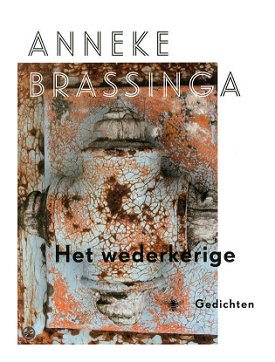
Het bestuur van de Stichting P.C. Hooft-prijs voor Letterkunde heeft afgelopen dinsdag bekend gemaakt dat de P.C. Hooft-prijs 2015 wordt toegekend aan de dichteres Anneke Brassinga (1948).
De P.C. Hooft-prijs is een van de belangrijkste literaire prijzen van Nederland. De oeuvreprijs wordt jaarlijks afwisselend toegekend voor proza, essays en poëzie. Dit jaar is de prijs, waaraan een bedrag is verbonden van 60.000 euro, bestemd voor poëzie.
De prijs wordt op 21 mei 2015, de sterfdag van dichter P.C. Hooft (1581-1647), uitgereikt.
Brassinga debuteerde in 1987 met de bundel Aurora. Daarna publiceerde ze nog een tiental dichtbundels. Haar laatste dichtbundel was, Ontij (2010). Anneke Brassinga publiceerde, naast poëzie, veel essays en verhalen. Verder heeft ze veel vertaalwerk verricht, waaronder de vertaling van boeken van o.a. schrijvers als Oscar Wilde, Jules Verne, Vladimir Nabokov en Sylvia Plath.
De dichteres wordt door de jury geprezen om het gebruik van bijna vergeten of in onbruik geraakte woorden. ‘In elk gedicht openen zich onvermoede vergezichten van zeggingskracht. De taal wordt omgekeerd, uitgekleed en weer opnieuw uitgedost totdat alle registers die er ooit in voorgekomen zijn weer meedoen.’
De jury van de prijs bestond dit jaar uit Wim Brands, Anja de Feijter, Rozalie Hirs, Erik Lindner en Maaike Meijer.
fleursdumal.nl magazine
More in: - Book News, Archive A-B, Art & Literature News, Sylvia Plath
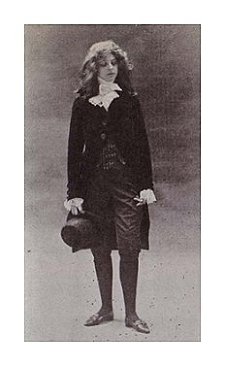
Renée Vivien
(1877-1909)
Elle règne
Le soir était plus doux que l’ombre d’une fleur.
J’entrai dans l’ombre ainsi qu’en un parfait asile.
La voix, récompensant mon attente docile,
Me chuchota: “Vois le palais de la douleur”.
Mes yeux las s’enchantaient du violet, couleur
Unique car le noir dominait. Immobile
La douleur demeurait assise, très tranquille.
J’admirais l’unité de sa grande pâleur.
Mon coeur se resserait dans un étau funeste,
Et j’allais m’éloigner, lorsqu’elle me dit : reste,
Aussitôt j’entendis prolonger un sanglot.
Dans la salle du trône, un clair de lune blême
Envahissait la nuit, comme un rocher le flot,
Et la Douleur régnait, implacable et suprême.
Renée Vivien poetry
fleursdumal.nl magazine
More in: Archive U-V, Renée Vivien, Vivien, Renée
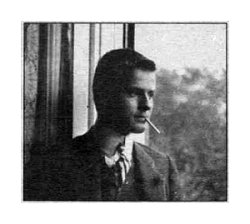
Hans Leybold
(1892-1914)
Der Tod des Menschen
Er hatte auf einmal kein Gesicht mehr.
Wo das sonst war, war nun eine weiße Fläche.
Seine Augen waren hinter die Schädelwand gerutscht.
Die Hände lagen unter seinen Füßen: man wusste
nicht, wie sie dorthin gekommen waren.
Seine Stimme war unter den Tisch gefallen; hatte
dort gescheppert, wie ein Tonteller; und war
dann plötzlich zerbrochen, mit einem letzten Klang.
Eine unvermutete Zigarre rauchte sich selbst auf.
Blies blaue Dünste.
Die krochen schweigsam in die getilgten Nasenlöcher des Menschen.
Da bissen sie sich fest; kratzten unnervige Wände. – –
Des Menschen Seele aber stolperte schon in paradiesischen Feldern.
Keine Windmühle störte seine nichterhoffte Aussicht.
Der Blick war weit und groß und grün.
Insekten tanzten golden.
Äcker brannten.
Hans Leybold poetry
fleursdumal.nl magazine
More in: *War Poetry Archive, Archive K-L, Expressionism, Hans Leybold, Leybold, Hans
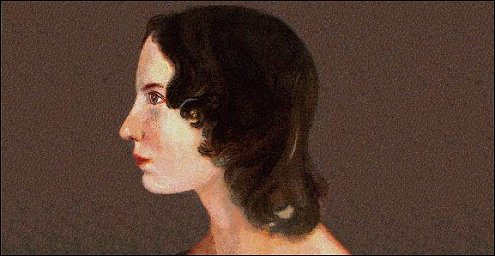
Emily Jane Brontë
(1818-1848)
Faith and Despondency
“The winter wind is loud and wild,
Come close to me, my darling child;
Forsake thy books, and mateless play;
And, while the night is gathering gray,
We’ll talk its pensive hours away;–
“Ierne, round our sheltered hall
November’s gusts unheeded call;
Not one faint breath can enter here
Enough to wave my daughter’s hair,
And I am glad to watch the blaze
Glance from her eyes, with mimic rays;
To feel her cheek, so softly pressed,
In happy quiet on my breast,
“But, yet, even this tranquillity
Brings bitter, restless thoughts to me;
And, in the red fire’s cheerful glow,
I think of deep glens, blocked with snow;
I dream of moor, and misty hill,
Where evening closes dark and chill;
For, lone, among the mountains cold,
Lie those that I have loved of old.
And my heart aches, in hopeless pain,
Exhausted with repinings vain,
That I shall greet them ne’er again!”
“Father, in early infancy,
When you were far beyond the sea,
Such thoughts were tyrants over me!
I often sat, for hours together,
Through the long nights of angry weather,
Raised on my pillow, to descry
The dim moon struggling in the sky;
Or, with strained ear, to catch the shock,
Of rock with wave, and wave with rock;
So would I fearful vigil keep,
And, all for listening, never sleep.
But this world’s life has much to dread,
Not so, my Father, with the dead.
“Oh! not for them, should we despair,
The grave is drear, but they are not there;
Their dust is mingled with the sod,
Their happy souls are gone to God!
You told me this, and yet you sigh,
And murmur that your friends must die.
Ah! my dear father, tell me why?
For, if your former words were true,
How useless would such sorrow be;
As wise, to mourn the seed which grew
Unnoticed on its parent tree,
Because it fell in fertile earth,
And sprang up to a glorious birth–
Struck deep its root, and lifted high
Its green boughs in the breezy sky.
“But, I’ll not fear, I will not weep
For those whose bodies rest in sleep,–
I know there is a blessed shore,
Opening its ports for me and mine;
And, gazing Time’s wide waters o’er,
I weary for that land divine,
Where we were born, where you and I
Shall meet our dearest, when we die;
From suffering and corruption free,
Restored into the Deity.”
“Well hast thou spoken, sweet, trustful child!
And wiser than thy sire;
And worldly tempests, raging wild,
Shall strengthen thy desire–
Thy fervent hope, through storm and foam,
Through wind and ocean’s roar,
To reach, at last, the eternal home,
The steadfast, changeless shore!”

Ellis Bell ( Emily Brontë) poetry
fleursdumal.nl magazine
More in: Anne, Emily & Charlotte Brontë, Archive A-B, Brontë, Anne, Emily & Charlotte

Hans Leybold
(1892-1914)
O über allen Wolkenfahnen ...
O über allen Wolkenfahnen,
die windgetrieben sich in Bläue krallen,
stehen unverrückbar Sonnen, welche niemals fallen.
wir schwingen uns bewegt in ihre Bahnen,
sind selber Nebel und bestrahlte Dämpfe.
Verdrängen wir die nächt’gen Schatten
der Erdendinge! Lassen alle nimmersatten
Begierden. Gelöst sind alle Krämpfe,
die hart die Glieder engten.
Wir werden Äther, Luft und Wellen.
Oh, aus unsern Leibern strömen Quellen,
spritzend in das ungewohnte Licht! Wir schenkten
uns dem All! Es hat uns königlich empfangen.
Mit Sturmtrompeten und mit Regenwehen.
Wie unsre Füße über Sonnenbrücken gehen!
In unsrer Hände Kelch hat sich ein Tropfen Gold gefangen.
Hans Leybold poetry
fleursdumal.nl magazine
More in: *War Poetry Archive, Archive K-L, Hans Leybold, Leybold, Hans
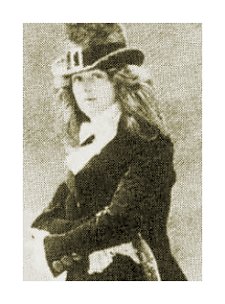
Renée Vivien
(1877-1909)
Je t’aime d’être faible…
Je t’aime d’être faible et câline en mes bras
Et de chercher le sûr refuge de mes bras
Ainsi qu’un berceau tiède où tu reposeras.
Je t’aime d’être rousse et pareille à l’automne,
Frêle image de la Déesse de l’automne
Que le soleil couchant illumine et couronne.
Je t’aime d’être lente et de marcher sans bruit
Et de parler très bas et de haïr le bruit,
Comme l’on fait dans la présence de la nuit.
Et je t’aime surtout d’être pâle et mourante,
Et de gémir avec des sanglots de mourante,
Dans le cruel plaisir qui s’acharne et tourmente.
Je t’aime d’être, ô soeur des reines de jadis,
Exilée au milieu des splendeurs de jadis,
Plus blanche qu’un reflet de lune sur un lys…
Je t’aime de ne point t’émouvoir, lorsque blême
Et tremblante je ne puis cacher mon front blême,
Ô toi qui ne sauras jamais combien je t’aime !
Renée Vivien poetry
fleursdumal.nl magazine
More in: Archive U-V, Renée Vivien, Vivien, Renée

Hans Leybold
(1892-1914)
Auch ein Nekrolog
für Christian Morgenstern
O Christian, wir glätten weinend unsre Bügelfalten:
auf Feuerleitern krochen wir mit dir in rhythmische Gerüste.
Mit dem Zement der Ironie ausfülltest du die Spalten
vermorschter Traditionen Mauer. O metaphysisches Gelüste.
O Huhn und Bahnhofshalle! Weit entfernte Latten!
Ihr Wiesel, Kiesel, mitten mang det Bachjeriesel!
Palmström, du ohngeschneuzter, den sie kastrieret hatten!
Genosse Korf, du nie banaler Wennschon – Stiesel!
(Verzeiht den Kitschton. Mich übermannte hier die Rührung.
Verzeih besonders du, Kollege Untermstriche:
schon hab ich in der harten Hand der Verse Führung
wieder; und komme mir auf meine Schliche.) –
Nun quäkt der Turmhahn geil auf Staackmanns Miste
sein Kikriki, und ist bald Ernst, bald Otto.
Verleger reißen sich die Haare aus, als ob das müßte,
und spielen mit der Perioden-Presse trotzdem Lotto.
O Christian: wie später Gotik wandgeklatschter Freske
(im spitzen Reigen härmender sebastianischer Figuren):
du paßtest nicht in unsren Krämerkram, du fleischgewordene Groteske;
nicht schmiegte sich dein edler Vollbart in die Schöße unsrer Huren!
Das Literatenleben, o du mein Christian, ist doch nicht besser
als das ärarische. (Sie dichten zur Musik von Walter Kollo!)
Wir tanzen zwischen Film und Feuilleton auf scharfem Messer . . .
Freu dich! Sei tot! Grüß mir, im Glanz geölter Locken, den Apollo!
Hans Leybold poetry
fleursdumal.nl magazine
More in: *War Poetry Archive, Archive K-L, Hans Leybold, Leybold, Hans
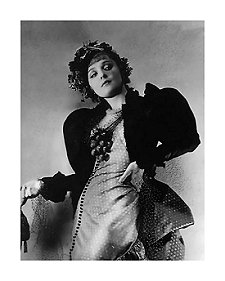
Renée Vivien
(1877-1909)
Undine
Your laughter is light, your caress deep,
Your cold kisses love the harm they do;
Your eyes-blue lotus waves
And the water lilies are less pure than your face..
You flee, a fluid parting,
Your hair falls in gentle tangles;
Your voice-a treacherous tide;
Your arms-supple reeds.
Long river reeds, their embrace
Enlaces, chokes, strangles savagely,
Deep in the waves, an agony
Extinguished in a night drift.
Renée Vivien poetry
fleursdumal.nl magazine
More in: Archive U-V, Renée Vivien, Vivien, Renée
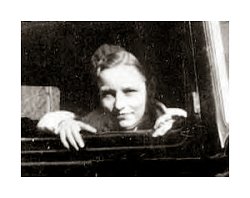
Bonnie Elizabeth Parker
(1910 – 1934)
The Street Girl
You don’t want to marry me honey,
Though just to hear you ask me is sweet;
If you did you’d regret it tomorrow
For I’m only a girl of the street.
Time was when I’d gladly have listened,
Before I was tainted with shame,
But it wouldn’t be fair to you honey;
Men laugh when they mention my name.
Back there on the farm in Nebraska,
I might have said yes to you then,
But I thought the world was a playground;
Just teeming with Santa Claus men.
So I left the old home for the city,
To play in its mad, dirty whirl,
Never knowing how little of pity,
It holds for a slip of a girl.
You think I’m still good-looking honey!
But no I am faded and spent,
Even Helen of Troy would look seedy,
If she followed the pace I went.
But that day I came in from the country,
With my hair down my back in a curl;
Through the length and the breadth of the city,
There was never a prettier girl.
I soon got a job in the chorus,
With nothing but looks and a form,
I had a new man every evening,
And my kisses were thrilling and warm.
I might have sold them for a fortune,
To some old sugar daddy with dough,
But youth called to youth for its lover,
There was plenty that I didn’t know.
Then I fell for the ‘line’ of a ‘junker’,
A slim devotee of hop,
And those dreams in the juice of a poppy;
Had got me before I could stop.
But I didn’t care while he loved me,
Just to lie in his arms was a delight,
But his ardour grew cold and he left me;
In a Chinatown ‘hop-joint’ one night.
Well I didn’t care then what happened,
A Chink took me under his wing,
And down there in a hovel of hell —
I laboured for Hop and Ah-Sing
Oh no I’m no longer a ‘Junker’,
The police came and got me one day,
And I took the one cure that is certain,
That island out there in the bay.
Don’t spring that old gag of reforming,
A girl hardly ever goes back,
Too many are eager and waiting;
To guide her feet off of the track.
A man can break every commandment
And the world will still lend him a hand,
Yet a girl that has loved, but un-wisely
Is an outcast all over the land.
You see how it is don’t you honey,
I’d marry you now if I could,
I’d go with you back to the country,
But I know it won’t do any good,
For I’m only a poor branded woman
And I can’t get away from the past.
Good-bye and God bless you for asking
But I’ll stick out now till the last.
Bonnie (from Bonnie & Clyde) Parker poetry
fleursdumal.nl magazine
More in: Archive O-P, Archive O-P, Bonnie and Clyde, Bonnie Parker, CRIME & PUNISHMENT
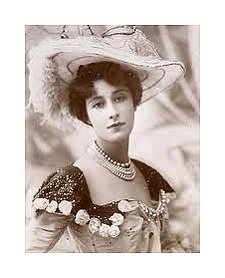
Renée Vivien
(1877-1909)
Chanson
The flight of the fluttering bat
Is tortuous, aguished, bizarre.
Then, beating her bruised wings thereat,
She turns, and looks back from afar.
Have you never felt, just one time,
How, drunken with painful defeat,
My soul, in a mad flight sublime,
Soared to your lips, distant but sweet?
Renée Vivien poetry
fleursdumal.nl magazine
More in: Archive U-V, Renée Vivien, Vivien, Renée

Hans Leybold
(1892-1914)
Konfusion – Ein Film
Plötzlich sprangen in den Straßen Gräber auf wie Erbsenschoten,
und jämmerliche Wesen wälzten sich heraus, die drohten
mit ihren blassgebleichten Knochen ihren Ururenkeln:
Die stoben fort und auseinander, als brennte es in ihren Schenkeln,
Pest oder Cholera im Bauch oder Jüngster Tag am Ende
(man muss doch sehn, ob man Rettung fände,
man hat sein kleines Leben lieb; die Hände,
die sich über alles strecken – –
wer weiß, ob man schlauer ist, versucht, sich zu verstecken).
Sie hopsen, springen ängstlich über Straßenbahngeleise
sie tanzen durcheinander: jeder in seiner Weise,
der eine verkriecht sich im Lokus, um sich zu retten,
der verwälzt sich tief in seine Betten,
viele fallen über die Geländer hoher Brücken,
fallen in hochgeschwollene Ströme, müssen in großen Schlücken
gelbes Wasser saufen, andere aber drücken
voll Furcht vor Unbekanntem sich an ihre Weiber.
Auf einmal greift eine unmäßig große Hand vom Himmel,
schiebt sich langsam durch chaotische Gewimmel,
plättet die Straßen als wären sie Wäsche,
greift aus dem Gewühl sich ein paar besonders fesche
Kokotten und Kavaliere, ein paar dicke Kommerzienräte,
stört in den diversen Salons die Abschiedsfete,
stürzt Börse und Kirche und Rathaus um, als mähte
sie Gras … hebt sich, verschwindet … nichts ist passiert.
Ein Gentleman sieht nach, außerordentlich blasiert.
Hans Leybold poetry
fleursdumal.nl magazine
More in: *War Poetry Archive, Archive K-L, Hans Leybold, Leybold, Hans
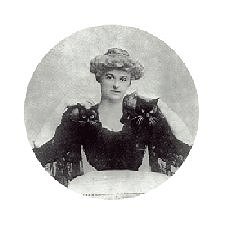
Renée Vivien
(1877-1909)
Your Strange Hair
Your strange hair, cold light,
Has pale glows and blond dullness;
Your gaze has the blue of ether and waves;
Your gown has the chill of the breeze and the woods.
I burn the whiteness of your fingers with kisses.
The night air spreads the dust from many worlds.
Still I don’t know anymore, in the heart of those deep nights,
How to see you with the passion of yesterday.
The moon grazed you with a slanted glow …
It was terrible, like prophetic lightning
Revealing the hideous below your beauty.
I saw-as one sees a flower fade-
On your mouth, like summer auroras,
The withered smile of an old whore.
Renée Vivien poetry
fleursdumal.nl magazine
More in: Archive U-V, Renée Vivien, Vivien, Renée
Thank you for reading Fleurs du Mal - magazine for art & literature